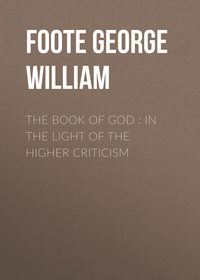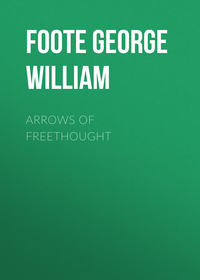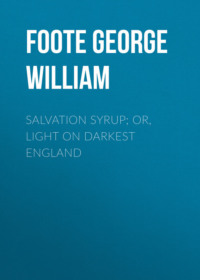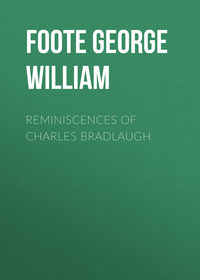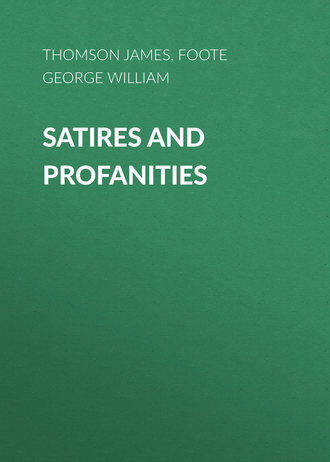 полная версия
полная версияSatires and Profanities
I have ventured to compare the government of the world in the Christian scheme, by a God and a Devil, with our own felicitous government by party. There is, however, or rather there appears to be, a striking difference between the two. In our government, when the Prime Minister finds himself decidedly in a minority, he goes out of office, and the Leader of the Opposition goes in; in the Government of the World the Leader of the Opposition seems to have always had an immense majority (and his majority in these days is probably larger than ever before, seeing that sceptics and infidels have multiplied exceedingly), yet the other side is supposed to retain permanent possession of office. I say “supposed,” because the Bible itself suggests that this popular opinion is a mistake, the Devil (if there be a Devil) being entitled by it the prince of this world, which surely implies his accession to power.
Although the Godhead or governing power of the world, according to the Christian scheme, is usually spoken and written of as a trinity, it is, in fact, quarterary or fourfold for Protestants, and quinary or fivefold for Roman Catholics. The former have God the Father, God the Son, God the Holy Ghost, and God the Devil; the latter supplement these with Goddess the Virgin Mary. Both formally acknowledge the first three as collectively and severally almighty, but Protestants implicitly acknowledge the fourth, and Roman Catholics the fifth, as more almighty still (these solecisms of dogma cannot be expressed without solecisms of language). With the Roman Catholics I am not concerned here. With regard to the Protestants, and those especially professing the Protestantism of the Church of England, I may safely affirm that the Devil is not less essential to their theology than is any person of the Trinity, or, in fact, than are the three persons together. Indeed, the Father and the Holy Ghost have been practically dispensed with, leaving Christ and Satan to fight the battle out between themselves.
As this is a gloriously scientific age, nobly enamored of the exact sciences, I will endeavor to expound this sublime subject of the divinity of the Church of England mathematically, even after the manner of the divine Plato in Book VIII. of “The Republic,” treating of divine and human generation; and in the “Timæus,” treating of the creation of the universal soul. His demonstrations, indeed, are so divinely obscure as to confound all the scholiasts; my demonstration, however, shall be so translucent that even the most learned and subtle lords of the Judicial Committee of the Privy Council, with their legal spectacles on, shall not be able to help seeing through it. And whereas the figures, which are shapes, are more intelligible to most people than the figures which are numbers, let the exposition be geometrical. We will say, then, that the Church of old conceived the divinity in the form of an equilateral triangle, whereof the base was Christ as the whole system was founded on belief in the Lord Jesus Christ, and the Father and the Holy Ghost were the two sides, leaning each on the other; and the Devil was the apex, as opposed to, and farthest from, our blessed Savior. But in course of time the theologians (perhaps merely wanting some occupation for their vigorous talents, perhaps deeming it undignified to have two persons of the godhead supporting each other obliquely like a couple of tipsy men, perhaps simply in order to make matters square) set to work, and pushed up the two sides, so that each might stand firm and perpendicular by itself. This process had two unforeseen results; it expanded the apex, which was a very elastic point, so that it became the crowning side of the square, and it so unhinged the sides that after a brief upright existence they lost their balance, and were carried to Limbo by the first wind of strange doctrine which blew that way; and the Devil and Christ, or Christ and the Devil (arrange the precedence as you please), were left alone confronting each other. These two are of course equal and parallel, the main distinction between them being that Christ is below, and the Devil above, or, in other words, that the Devil is superior and Christ inferior (the Devil seems entitled to the precedence). Thus matters have continued even to the present time, the divinity showing itself, as we may say, without form and void; and we are free to speculate on the momentous questions: Will the crown (which is the Devil) fall into the base (which is Christ)? Will the base float up into the crown? Will the two coalesce half way? Will they both, unknit from their sides, be carried away to Limbo by some blast of strange doctrine? One thing is certain, they cannot long remain as they are. Rare Ben Jonson chanted the Trinity, or Equilateral Triangle; rare Walt Whitman has chanted the Square Deific (with Satan for the fourth side); no poet can care to chant the two straight lines which, in the language of Euclid, and in the region of intelligence, cannot enclose a space, but are as a magnified symbol of equal – to nothing.
P. S. – It may be appropriately added that the books of Euclid are really symbolic and prophetic expositions of most sublime and sacrosanct mysteries, though in these days few persons seem aware of the fact. Thus the very first definition, “A point is position without magnitude,” exactly defines every point of difference between the theologians. So a line, which is as the prolongation of a point, or length without breadth, represents in one sense (for each symbol has manifold meanings) the history of any theological system. An acute angle is, say, Professor Clifford; an obtuse angle, Mr. Whalley; a right angle, the present writer: non angeli sed Angli. The first proposition, “To erect an equilateral triangle upon a given finite straight line,” indicates the problem solved by Christianity, when it erected the Trinity on the basis of the man we call Jesus. This pregnant subject should be worked out in detail through the whole eight books.
RELIGION IN THE ROCKY MOUNTAINS
Top of Pike’s Peak, March 4th, 1873.
Honored with your special commission, I at once hurried across to Denver, and thence still westward until I found myself among the big vertebrae of this longish backbone of America. I have wandered to and fro among the new cities, the advanced camps of civilisation, always carefully reticent as to my mission, always carefully inquiring into the state of religion both in doctrine and practice. You were so hopeful that high Freethought would be found revelling triumphant in these high free regions, that I fear you will be acutely pained by this my true report. Churches and chapels of all kinds abound – Episcopalian, Methodist Episcopal (for the Methodists here have bishops), Presbyterian, Baptist, Congregational, Roman Catholic, etc. Zeal inflaming my courage, three and even four times have I ventured into a church, each time enduring the whole service; and if I have not ventured oftener, certainly I had more than sufficient cause to abstain. For as I suffered in my few visits to churches in your England, so I suffered here; and such sufferings are too dreadful to be frequently encountered, even by the bravest of the brave. Whether my sensations in church are similar to those of others, or are peculiar to myself, I cannot be sure; but I am quite sure that they are excruciating. On first entering I may feel calm, wakeful, sane, and not uncomfortable, except that here I rather regret being shut in from the pure air and splendid sky, and in England rather regret having come out through the raw, damp murk, and in both regret that civilisation has not yet established smoking-pews; but the Church is always behind the age. It is pleasant for awhile to note the well-dressed people seated or entering; the men with unctuous hair and somewhat wooden decorum; the women floating more at ease, suavely conscious of their fine inward and outward adornments. It is pleasant to keep a hopeful look-out for some one of more than common beauty or grace, and to watch such a one if discovered. As the service begins, and the old, old words and phrases come floating around me, I am lulled into quaint dream-memories of childhood; the long unthought-of school-mates, the surreptitious sweetstuff, the manifold tricks and smothered laughter, by whose aid (together with total inattention to the service, except to mark and learn the text) one managed to survive the ordeal. The singing also is pleasant, and lulls me into vaguer dreams. Gradually, as the service proceeds, I become more drowsy; my small faculties are drugged into quiet slumber, they feel themselves off duty, there is nothing for which they need keep awake. But, with the commencement of the sermon, new and alarming symptoms arise within me, growing ever worse and worse until the close. Pleasure departs with tranquility, the irritation of revolt and passive helplessness is acute. I cannot find relief in toffy, or in fun with my neighbors, as when I was a happy child. The old stereotyped phrases, the immemorial platitudes, the often-killed sophistries that never die, come buzzing and droning about me like a sluggish swarm of wasps, whose slow deliberate stinging is more hard to bear than the quick keen stinging of anger. Then the wasps, penetrating through my ears, swarm inside me; there is a horrid buzzing in my brain, a portentous humming in my breast; my small faculties are speedily routed, and disperse in blind anguish, the implacable wasps droning out and away after them, and I am left void, void; with hollow skull, empty heart, and a mortal sinking of stomach; my whole being is but a thin shell charged with vacuity and desperate craving; I expect every instant to collapse or explode. It is but too certain that if anyone should then come to lead me off to an asylum for idiots, or a Young Men’s Christian Association, or any similar institution, I could not utter a single rational word to save myself. And though all my faculties have left me, I cannot attempt to leave the church; decorum, rigid and frigid, freezes me to my seat; I stare stonily in unimaginable torture, feebly wondering whether the sermon will outlast my sanity, or my sanity outlast the sermon. When at length released, I am so utterly demoralised that I can but smoke furiously, pour much beer and cram much dinner into my hollowness, and so with swinish dozing hope to feel better by tea-time. Now, though in order to fulfil the great duties you entrust to me, I have cheerfully dared the Atlantic, and spent long days and perilous nights in railroad cars, and would of course (were it indeed necessary) face unappalled mere physical death and destruction, I really could not go on risking, with the certainty of ere long losing, my whole small stock of brains; especially as the loss of these would probably rather hinder than further the performance of the said duties. For suppose me reduced to permanent idiocy by church-going, become a mere brazen hollowness with a riotous tongue like Cowper’s church-going bell; is it not most likely that I would then turn true believer, renouncing and denouncing your noble commission, even as you would renounce and denounce your imbecile commissioner?
Finding that I could not pursue my inquiries in the churches and chapels, I was much grieved and perplexed, until one of those thoughts occurred to me which are always welcome and persuasive, because in exact agreement with our own desires or necessities. I thought of what I had remarked when visiting your England: how the churches and chapels and lecture-halls, each sect thundering more or less terribly against all the others, made one guess that the people were more disputatious than pious; how one became convinced, in spite of his infidel reluctance, that the people were indeed, as a rule, thoroughly and genuinely religious, by mingling freely with them in their common daily and nightly life. I asked myself, What really proved to me the pervading Christianity of England? the sermons, the tracts, the clerical lectures, the missionary meetings? the cathedrals and other theatres and music-halls crowded with worshippers on Sunday, while the museums and other public-houses were empty and shut? No, scarcely these things; but the grand princeliness of the princes, the true nobleness of the nobles, the lowliness of the bishops, the sanctity of the clergy, the honesty of the merchants, the veracity of the shopkeepers, the sobriety and thrift of the artisans, the independence and intelligence of the rustics; the general faith and hope and love which brightened the sunless days, the general temperance and chastity which made beautiful the sombre nights; the almost universal abhorrence of the world, the flesh, and the Devil; the almost universal devotion to heaven, the spirit, and God.
I thereupon determined to study the religion out here, even as I had studied it in England, in the ordinary public and private life of the people; and you will doubtless be sorely afflicted to learn that I have found everywhere much the same signs of genuine, practical Christianity as are so common and patent in the old country. The ranchmen have sown the good seed, and shall reap the harvest of heavenly felicity; the stockmen will surely be corraled with the sheep, and not among the goats, at the last day; not to gain the whole world would the storekeepers lose their own souls; the pioneers have found the narrow way which leadeth unto life; the fishermen are true disciples, the trappers catch Satan in his own snares, the hunters are mighty before the Lord; bright are the celestial prospects of the prospectors, ana the miners are all stoping-out that hidden treasure which is richer than silver and much fine gold. As compared with the English, these Western men are perchance inferior in two important points of Christian sentiment: they probably do not fear God, being little given to fear anyone; they certainly do not honor the king, perhaps because they unfortunately have none to honor. On the other hand, as I have been assured by many persons from the States and the old country, they are even superior to the English in one important point of Christian conduct. Christ has promised that in discharging the damned to hell at the day of judgment, he will fling at them this among other reproaches, “I was a stranger, and ye took me not in,” and this particular rebuke seems to have wrought a peculiarly deep impression in these men, perhaps because they have much more to do with strangers than have people in old settled countries, so much, indeed, that the word “stranger” is continually in their mouths. The result is (as the said persons from England and the States have often solemnly assured me) that any and every stranger arriving in these regions is most thoroughly, most beautifully, most religiously taken in. So that should any of these fine fellows by evil hap be among the accursed multitude whom Christ thus addresses, they will undoubtedly retort in their frank fashion of speech: “Wall, boss, it may be right to give us hell on other counts, but you say you was a stranger and we didn’t take you in. What we want to know is, Did you ever come to our parts to trade in mines or stock or sich? If you didn’t, how the Devil could we take you in? if you did, it’s a darned lie, and an insult to our understanding to say we didn’t.”
But though the practical life out here is so veritably Christian, you still hope that at any rate the creeds and doctrines are considerably heterodox. I am sincerely sorry to be obliged to destroy this hope. In the ordinary talk of the men continually recur the same or almost the same expressions and implications of orthodox belief, as are so common in your England, and throughout Christendom. Why such formulas are generally used by men only, I have often been puzzled to explain: it may be that the women, who in all lands attend divine service much more than do the men, find ample expression of their faith in the set times and places of public worship and private prayer; while the men, less methodical, and demanding liberal scope, give it robust utterance whenever and wherever they choose. These formulas, as you must have often remarked, are most weighty and energetic; they avouch and avow the supreme personages and mysteries and dogmas of their religion; they are usually but brief ejaculations, in strong contrast to those long prayers of the Pharisees which Jesus laughed to scorn; and they are often so superfluous as regards the mere worldly meaning of the sentences in which they appear, that it is evident they have been interjected simply to satisfy the pious ardor of the speaker, burning to proclaim in season and out of season the cardinal principles of his faith. I say speaker, and not writer, because writing, being comparatively cold and deliberate, seldom flames out in these sharp swift flashes, that leap from living lips touched with coals of fire from the altar.1
I am aware that these fervid ejaculations are apt to be regarded by the light-minded as trivial, by the cold-hearted as indecorous, by the sanctimonious as even profane; but to the true philosopher, whether he be religious or not, they are pregnant with grave significance. For do not these irrepressible utterances burst forth from the very depths of the profound heart of the people? Are they not just as spontaneous and universal as is the belief in God itself? Are they not among the most genuine and impassioned words of mankind? Have they not a primordial vigor and vitality? Are they not supremely of that voice of the people which has been well called the voice of God? Thus when your Englishman instead of “Strange!” says “The Devil!” instead of “Wonderful!” cries “Good Heavens!” instead of “How startling!” exclaims “O Christ!” he does more than merely express his emotions, his surprise, his wonder, his amaze; he hallows it to the assertion of his belief in Satan, in the good kingdom of God, in Jesus; and, moreover, by the emotional gradation ranks with perfect accuracy the Devil lowest in the scale, the heavens higher, Christ the loftiest. When another shouts “God damn you!”(1) he not only condemns the evil of the person addressed; he also takes occasion to avow his own strong faith in God and God’s judgment of sinners. Similarly “God bless you!” implies that there is a God, and that from him all blessings flow. How vividly does the vulgar hyperbole “Infernally hot,” prove the general belief in hell-fire! And the phrase “God knows!” not merely declares that the subject is beyond human knowledge, but also that an all-wise God exists. Here in the West, as before stated, such brief expressions of faith, which are so much more sincere than long formularies repeated by rote in church, are quite as common as in your England. When one has sharply rebuked or punished another, he says “I gave him hell.” And that this belief in future punishment pervades all classes is proved by the fact that even a profane editor speaks of it as a matter of course. For the thermometer having been stolen from his sanctum, the said worthy editor announced that the mean cuss who took it might as well bring or send it back (no questions asked) for it could not be of any use to him in the place he was going to, as it only registered up to 212 degrees. The old notion that hell or Hades is located in the middle of the earth (which may have a scientific solution in the Plutonic theory that we dwell on the crust of a baked dumpling full of fusion and confusion) is obviously tallied by the miner’s assertion that his vein was true-fissure, reaching from the grass-roots down to hell. The frequent phrase “A God-damned liar,” “A God-damned thief,” recognise God as the punisher of the wicked. I have heard a man complain of an ungodly headache, implying first, the existence of God, and secondly, the fact that the Godhead does not ache, or in other words is perfect. Countless other phrases of this kind might be alleged, a few of them astonishingly vigorous and racy, for new countries breed lusty new forms of speech; but the few already given suffice for my present purpose. One remarkable comparison, however, I cannot pass over without a word: it is common to say of a man who has too much self-esteem, He thinks himself a little tin Jesus on wheels. It is clear that some profound suggestion, some sacrosanct mystery, must underlie this bold locution; but what I have been hitherto unable to find out. The connexion between Jesus and tin may seem obvious to such as know anything of bishops and pluralists, pious bankers and traders. But what about the wheels? Have they any relation to the opening chapter of Ezekiel? It is much to be wished that Max Müller, and all other such great scholars, who (as I am informed, for it’s not I that would presume to study them myself) manage to extract whatever noble mythological meanings they want, from unintelligible Oriental metaphors and broken phrases many thousand years old, would give a few years of their superfluous time to the interpretation of this holy riddle. Do not, gentleman, do not by all that is mysterious, leave it to the scholars of millenniums to come; proceed to probe and analyse and turn it inside out at once, while it is still young and flourishing, while the genius who invented it is still probably alive, if he deceased not in his boots, as decease so many gallant pioneers.
And here, before afflicting you further, O much-enduring editor, let me soothe you a little by stating that some particles of heresy, some few heretics, are to be found even here. I have learned that into a very good and respectable bookstore in a city of these regions, certain copies of Taylor’s “Diegesis” have penetrated, who can say how? and that some of these have been sold. A living judge has been heard to declare that he couldn’t believe at all in the Holy Ghost outfit. It has also been told me of a man who must have held strange opinions as to the offspring of God the Father, though certainly this man was not a representative pioneer, being but a German miner, fresh from the States. This Dutchman (all Germans here are Dutch, doubtless from Deutsche, the special claims of the Hollanders being ignored) was asked solemnly by a clergyman, “Who died to save sinners?” and answered “Gott.” “What,” said the pained and pious pastor, “don’t you know that it was Jesus the Son of God?” “Ah,” returned placidly the Dutchman, “it vass one of te boys, vass it? I always dought it vass te olt man himselben.” This good German may have been misled by the mention of the sons of God early in Genesis, yet it is strange that he knew not that Jesus is the only son of God, and our savior. A story is moreover told of two persons, of whom the one boasted rather too often that he was a self-made man, and the other at length quietly remarked that he was quite glad to hear it, as it cleared God from the responsibility of a darned mean bit of work. Whence some have inferred the heresy that God is the creator of only a part of the universe; but I frankly confess that in my own opinion the reply was merely a playful sarcasm.
The most decided heresy which has come under my own observation was developed in the course of a chat between two miners in a lager-beer saloon and billiard-hall; into the which, it need scarcely be remarked, I was myself solely driven by the fierce determination to carry out my inquiries thoroughly. Bill was smoking, Dick was chewing; and they stood up together, at rather rapidly decreasing intervals, for drinks of such “fine old Bourbon” rye whiskey as bears the honorable popular title of rot-gut. The frequency with which the drinking of alcoholic liquors leads to impassioned and elevated discussion of great problems in politics, history, dog-breeding, horse-racing, moral philosophy, religion, and kindred important subjects, seems to furnish a strong and hitherto neglected argument against tee-totalism. There are countless men who can only be stimulated to a lively and outspoken interest in intellectual questions by a series of convivial glasses and meditative whiffs. If such men really take any interest in such questions at other times, it remains deplorably latent, not exercising its legitimate influence on the public opinion of the world. Our two boys were discussing theology; and having had many drinks, grappled with the doctrine of the triune God. “Wall,” said Bill, “I can’t make out that trinity consam, that three’s one and one’s three outfit.” Whereto Dick: “Is that so? Then you wam’t rigged out for a philosopher, Bill. Look here,” pulling forth his revolver, an action which caused a slight stir in the saloon, till the other boys saw that he didn’t mean business; “look here, I’ll soon fix it up for you. Here’s six chambers, but it’s only one pistol, with one heft and one barrel; the heft for us to catch hold of, the barrel to kill our enemy. Wall, God a’mighty’s jest made hisself a three-shooter, while he remains one God; but the Devil, he’s only a single-shot deringer: so God can have three fires at the Devil for one the Devil can have at him. Now can’t you figure it out?” “Wall,” said Bill, evidently staggered by the revolver, and feeling, if possible, increased respect for that instrument on finding it could be brought to bear toward settlement of even such a difficulty as the present; “Wall, that pans out better than I thought it could: but to come down to the bedrock, either God’s a poor mean shot or his piece carries darned light; for I reckon the Devil makes better play with his one chamber than God with his three.” “Maybe,” replied Dick, with calm candor, strangely indifferent to the appalling prospects this theory held out for our universe; “some of them pesky little things jest shoot peas that rile the other fellow without much hurting him, and then, by thunder, he lets daylight through you with one good ball. Besides, it’s likely enough the Devil’s the best shot, for he’s been consarned in a devilish heap of shooting more than God has; at any rate” – perchance vaguely remembering to have heard of such things as “religious wars” – “of late years, between here and ’Frisco. Wall, I guess I don’t run the creation. Let’s liquor;” manifestly deriving much comfort from the consciousness that he had no hand in conducting this world. Bill acquiesced with a brief “Ja,” and they stood up for another drink. I am bound to attest that, in spite or because of the drinks, they had argued throughout with the utmost deliberation and gravity, with a dignified demeanour which Bishops and D.Ds. might envy, and ought to emulate.



